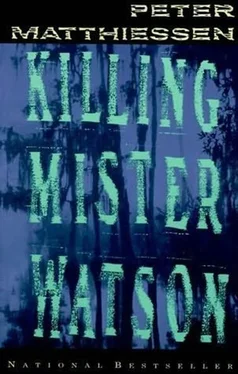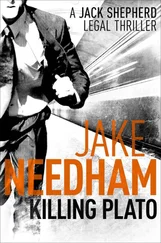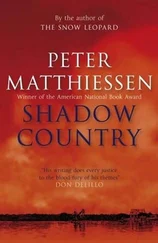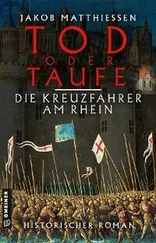Peter Matthiessen - Killing Mister Watson
Здесь есть возможность читать онлайн «Peter Matthiessen - Killing Mister Watson» весь текст электронной книги совершенно бесплатно (целиком полную версию без сокращений). В некоторых случаях можно слушать аудио, скачать через торрент в формате fb2 и присутствует краткое содержание. Жанр: Современная проза, на английском языке. Описание произведения, (предисловие) а так же отзывы посетителей доступны на портале библиотеки ЛибКат.
- Название:Killing Mister Watson
- Автор:
- Жанр:
- Год:неизвестен
- ISBN:нет данных
- Рейтинг книги:4 / 5. Голосов: 1
-
Избранное:Добавить в избранное
- Отзывы:
-
Ваша оценка:
- 80
- 1
- 2
- 3
- 4
- 5
Killing Mister Watson: краткое содержание, описание и аннотация
Предлагаем к чтению аннотацию, описание, краткое содержание или предисловие (зависит от того, что написал сам автор книги «Killing Mister Watson»). Если вы не нашли необходимую информацию о книге — напишите в комментариях, мы постараемся отыскать её.
Killing Mister Watson — читать онлайн бесплатно полную книгу (весь текст) целиком
Ниже представлен текст книги, разбитый по страницам. Система сохранения места последней прочитанной страницы, позволяет с удобством читать онлайн бесплатно книгу «Killing Mister Watson», без необходимости каждый раз заново искать на чём Вы остановились. Поставьте закладку, и сможете в любой момент перейти на страницу, на которой закончили чтение.
Интервал:
Закладка:
Walt Langford smiles. "Now that don't mean I'll let you know if he comes back!" he says.
Jim Cole booms out, "If he comes back, I'm nominating that sonofagun for sheriff!"
I manage a grin, to be polite, when Langford guffaws too loudly and too long. "Ol' Jim," Walt sighs, and pumps out another laugh, as if unable to get over such a humorous person.
"Ol' Jim," I repeat quietly, to help Walt out.
BILL HOUSE
Early in the century, the produce business for Key West begun to die. Ted Smallwood had two hundred and fifty alligator pear trees, reached all the way across Chokoloskee Island, used to ship barrels of them things to Punta Gorda, sent 'em north by railroad, got five cents apiece. Storters still grew cane at Half Way Creek, Will Wiggins, too, but nobody lived there anymore. Lopezes was on Lopez River, D.D. House had his home on Chokoloskee but his cane farm on an old bird rookery north of Chatham River we call House Hammock. Ed Watson was farming both sides of the river now at Chatham Bend, and he done better than us all. C.G. McKinney still farmed some up Turner River, and Charlie T. Boggess at Sandfly Key-these were small produce gardens-but Chokoloskee farmers give up one by one. Too much rain or not enough, too much salt water to leach out after a storm. That black soil on the shell mounds had no minerals to speak of, just tuckered out in a few years, same as the women. There was more livelihood in bird plumes, gator hides, and pelts of coon and otter. Then the wild things give out, too. Good thing the clam factory got started, cause there wasn't much left to us but ricking buttonwood, a little fishing.
Watson had been gone for years and nobody was farming Chatham Bend, although good ground high enough to settle was running out in all them northern islands. Our House clan came and went from Big House Hammock, but most all of that Watson country emptied out, all the way south to Lost Man's and beyond.
Used to be three plantations on Rodgers River, had beautiful royal palms, date palms, too, and tamarinds-quitclaims to all of 'em was up for sale and had no buyers. After all the hard labor and sweat and suffering them Atwells put in, near to thirty years of it, them houses was just rotting on them mounds, all sad and gray, boilers rusted and cisterns crusted over with green slime and rot from them poor animals that fell in trying to get their water. And the fields growed under with thorn jungle, and the dark river taking everything away, back to the wilderness, like nobody but the old Calusas ever been there. Later on, when the Storter boys and Henry Short went up in there looking for mullet, they seen signs posted on the bank at them old places, and what was on them signs was skulls and crossbones, kind of crude painted, white on black. No law against putting up signs, I guess, might been somebody's idea of a joke, ain't saying who.
People came and then they went. They never stayed long once the silence got 'em.
For some years after 1901, there was only two strong families around Lost Man's. Richard Hamilton and his boys lived on Hog Key, Wood Key, north of Lost Man's River, that was one clan; and Old Man James Hamilton and his sons Frank, Lewis, and Jesse was on Lost Man's Beach, south of the river mouth, that was the other. Henry Thompson was married in with the James Hamiltons there at South Lost Man's. He was Watson's friend, and the Richard Hamiltons got friendly with Watson, too, took pains to keep it that way.
Henry Thompson done some farming and some fishing, too, helped Old Man James and his youngest, Jesse, build a pretty fair shell road back in there to that old Calusa mound we called Royal Palm Hammock. Big grove of royal palms on there then, and grubbing out them palms paid for the work. Hamiltons claimed they aimed to farm, cause wherever royal palms raise above the mangrove, there is pretty sure to be a good high mound, with good black soil, but I don't believe that was the only reason. Seemed kind of funny that big mound were so far back in from the water, like them oldtime Injuns was trying to hide it. Old Chevelier had got everybody thinking about buried treasure, what with Bill Collier's finds up there at Marco, and Old Juan Gomez's tales out on Panther Key. I do know Henry Short got a bad case of it. Henry's dream was to strike treasure and get away somewhere, though I'm damned if I know where a nigra could escape to, back in them days.
Headed down around Shark River, we used to see them beautiful royal palms all along there back of Lost Man's Beach. That shell ridge must been five miles long, probably still is. All them fine trees along that coast are gone today, don't see a one. Nobody will miss 'em that never seen 'em there, I reckon.
One of them cattle kings, Jim Cole, claimed them palms was wasted where they was so he had us dead-broke Island men dig the last one out to prettify the city streets. Put 'em on postcards, bring in tourists from the north. Tropical paradise, y'know. Course the most of 'em died-nobody watered 'em-so they might's well lived along right where they was.
This was when Cole and Langford brung the railroad in, and the tourists started coming in their thousands, Godamighty! Too bad Jim Cole didn't order up some gumbo-limbos, cause them trees is scraggily, thin-skinned, always red and peeling. Us local folks call that the tourist tree.
It was along about this time that C.G. McKinney made the mistake of not keeping his post office money where he could put his hands on it. This was somewhere around 1906. They seldom inspected, but the day they did, the money was somewhere else. Wasn't lost, just in use, you know, he didn't have it handy, and by law he had to have it handy there and then. So Smallwood loaned McKinney the money to get him out of trouble, and before you know it, Ted was postmaster instead, and not only that but biggest trader, owned most all of Chokoloskee Island, left the rest of us in the dust. For the next thirty-five years and more, Smallwoods was the main family on that island.
This was the year Mister Watson brought his new wife back to Chokoloskee Bay. First thing he done was pay a call on Storters, open a new account, and he done the same across the Bay at Smallwoods. Probably figured that so long as he stayed friends with the traders, he would be all right.
MAMIE SMALLWOOD
I recall the day in 1906 when Mister Watson came back to Chokoloskee-everybody does, I guess, because he showed up in the first motor launch we ever saw. Folks heard it coming, pop-pop-popping down the Pass from Sandfly Key-for years us young folks called that boat the May-Pop, that's how cranky she was. Men and women both left their tomato patch and hustled along after the children, who went flying and hollering down to the landing. At Chokoloskee we were way behind the times, though not all of us knew it, and pretty desperate for a look at something new.
Even a quarter mile away, out in the channel, the figure at the helm looked too familiar, the strong bulk of him, and the broad hat. When he saw the crowd, he tipped that hat and bowed a little, and the sun fired that dark red hair-color of dead blood, Grandma Ida used to say, only she never thunk that up till some years later, when the ones who never knew him called him Bloody Watson. Ida Borders House of South Carolina-well, we'll miss her. But it was that little bow he made that told us straight off who it was, and my heart jumped like a mullet, and it weren't the only one. A hush and stillness fell on Chokoloskee, like our poor little community had caught its breath, like we was waiting for a storm to break from high dark thunderheads over the Glades in summer, just before the first cold wind and rain.
"Speak of the Devil," says Grandma Ida, primping up her hair, though no one had spoke of Him lately as I knew of. Grandma knew she was looking straight at Satan, and no mistake. That man has dared to come back here among us! All around the shore they was raising fingertips up to their mouths, rolling their eyes, O Lord-a-mercy-now why do some fool women do that, you suppose?-and staring walleyed at each other like a flock of haunts. Then all together they dared look again, and all together gave a grisly moan of woe. Wouldn't surprise me if I gave a moan myself. It was like in Revelations, regular Doomsday. I didn't see no one rend their clothes nor tear their hair, but a couple of God-fearing bodies hurried their offsprings up the hill, squawking and scattering like hens, not cause they really thought Mister Watson might attack 'em but to show them other biddies how Mrs. So-and-So wouldn't let her angels have no truck with no Methodist murderer.
Читать дальшеИнтервал:
Закладка:
Похожие книги на «Killing Mister Watson»
Представляем Вашему вниманию похожие книги на «Killing Mister Watson» списком для выбора. Мы отобрали схожую по названию и смыслу литературу в надежде предоставить читателям больше вариантов отыскать новые, интересные, ещё непрочитанные произведения.
Обсуждение, отзывы о книге «Killing Mister Watson» и просто собственные мнения читателей. Оставьте ваши комментарии, напишите, что Вы думаете о произведении, его смысле или главных героях. Укажите что конкретно понравилось, а что нет, и почему Вы так считаете.












